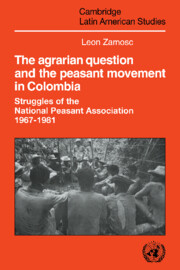 The Agrarian Question and the Peasant Movement in Colombia
The Agrarian Question and the Peasant Movement in Colombia Book contents
- Frontmatter
- Contents
- List of tables, figures, and maps
- Foreword by Tedor Shanin
- Foreword by UNRISD
- Acknowledgments
- List of abbreviations
- Map 1 Republic of Colombia
- Introduction
- 1 The agrarian question in Colombia
- 2 Reformism and the beginnings of the peasant movement
- 3 The radicalization of ANUC and the great waves of land invasions
- 4 Counterreform
- 5 The contradictory influences of peasant politicization
- 6 Concessions and repressive escalation
- 7 The new occupational alternatives and the issue of the rural proletariat
- 8 Partial repeasantization and the question of the new peasant settlements
- 9 Final crisis and clientelist regression of ANUC
- 10 Overview and final remarks
- Notes
- Bibliography
- Index
- Cambridge Latin American Studies
- Frontmatter
- Contents
- List of tables, figures, and maps
- Foreword by Tedor Shanin
- Foreword by UNRISD
- Acknowledgments
- List of abbreviations
- Map 1 Republic of Colombia
- Introduction
- 1 The agrarian question in Colombia
- 2 Reformism and the beginnings of the peasant movement
- 3 The radicalization of ANUC and the great waves of land invasions
- 4 Counterreform
- 5 The contradictory influences of peasant politicization
- 6 Concessions and repressive escalation
- 7 The new occupational alternatives and the issue of the rural proletariat
- 8 Partial repeasantization and the question of the new peasant settlements
- 9 Final crisis and clientelist regression of ANUC
- 10 Overview and final remarks
- Notes
- Bibliography
- Index
- Cambridge Latin American Studies
Summary
The response of the dominant classes to the peasant land struggles would have drastic consequences for the evolution of the agrarian question in Colombia. Throughout the rest of the Pastrana administration, the counteroffensive would eradicate all traces of reform in state policy, transforming it into an instrument of defense of the landowners' interests, support for capitalist agriculture, and the curbing of peasant aspirations.
Reversion of agrarian policy under the Pastrana administration
Pastrana's counteroffensive had started with the restriction on ANUC after the invasions of February 1971 and the public declarations of the new Minister of Agriculture, Jaramillo Ocampo. The minister had denounced the Mandato Campesino as a call for subversion, and in September he attacked some of the activities of INCORA and the whole idea of agrarian reform in a congressional debate. During the second wave of land invasions in October and November 1971, the clamor for counterreform reached hysterical proportions. The editorial pages of the Conservative newspapers urged action against the danger of “agrarian communism,” brandishing such “proofs” as the use of agricultural tools made in Czech-oslovakia in one case of land occupation and the showing of a Russian film in some INCORA seminars on cooperativism. The federations of landowners (including SAC, FEDEGAN, and the associations of planters and growers of sugar, rice, cotton, cacao, and grains) submitted a joint memorandum to the government demanding “an immediate end to the impending threat to the institutions and the social peace of the Nation.”
- Type
- Chapter
- Information
- The Agrarian Question and the Peasant Movement in ColombiaStruggles of the National Peasant Association, 1967–1981, pp. 97 - 104Publisher: Cambridge University PressPrint publication year: 1986
